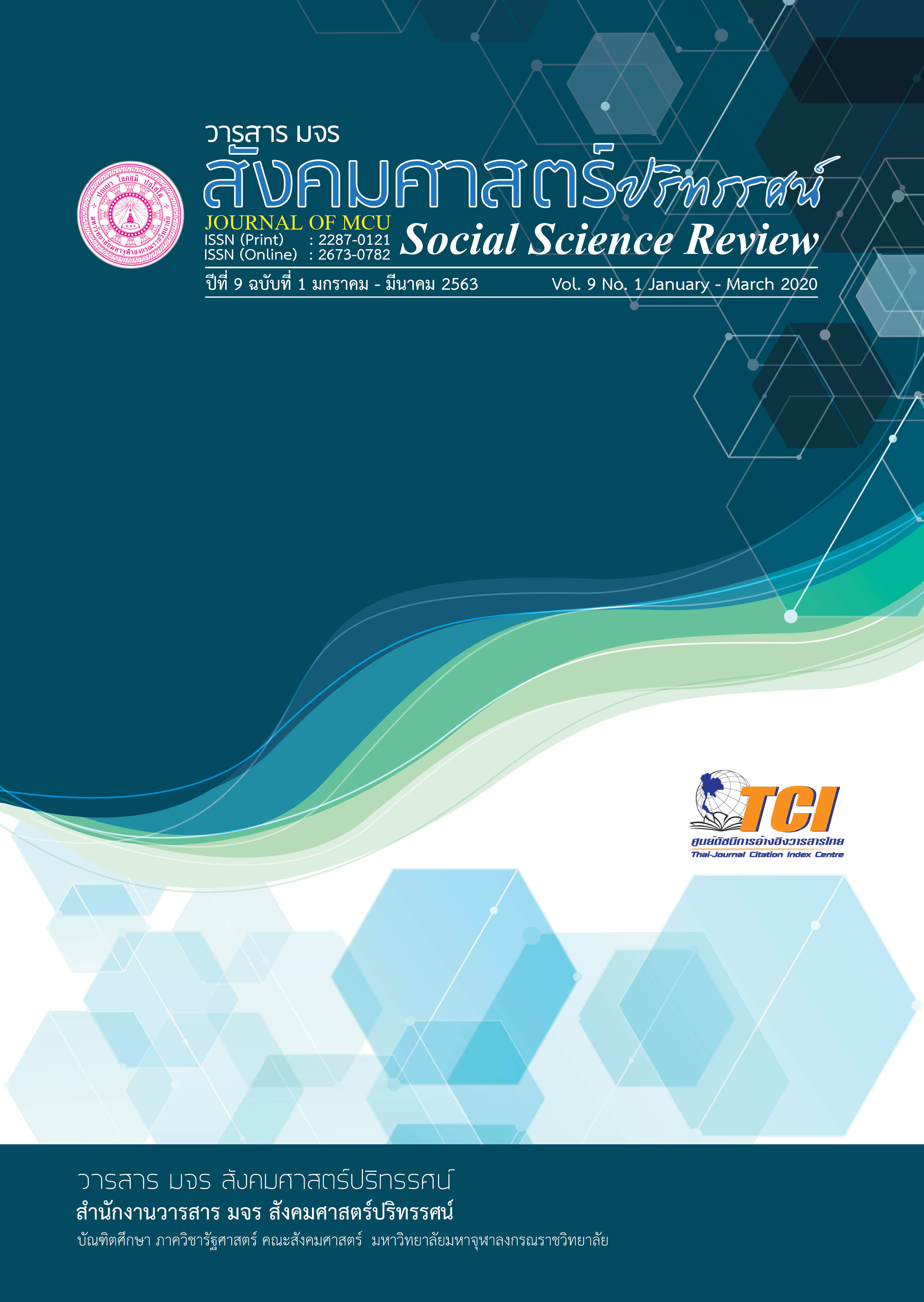การศึกษาการจัดเรียนการสอนแบบแนะให้รู้คิดร่วมกับการจัดการเรียนรู้เชิงรุก เรื่อง อสมการ ที่มีต่อทักษะและกระบวนการทางคณิตศาสตร์ ของนักเรียน ชั้นมัธยมศึกษาปีที่ 4 โรงเรียนมัธยมฐานบินกำแพงแสน
คำสำคัญ:
การจัดการเรียนรู้เชิงรุก, การสอนแบบแนะให้รู้คิด, ทักษะและกระบวนการทางคณิตศาสตร์บทคัดย่อ
บทความวิจัยนี้มีวัตถุประสงค์เพื่อเปรียบเทียบทักษะและกระบวนการก่อนเรียนและหลังเรียน และศึกษาพัฒนาการของนักเรียน กลุ่มตัวอย่างที่ใช้ในการวิจัย คือ นักเรียนชั้นมัธยมศึกษาปีที่ 4/3 โรงเรียนมัธยมฐานบินกำแพงแสน ปีการศึกษา 2562 จำนวน 45 คน ซึ่งได้มาจากการสุ่มแบบแบ่งกลุ่ม เครื่องมือที่ใช้ประกอบด้วย (1) แผนการจัดการเรียนรู้ (2) แบบทดสอบวัดทักษะและกระบวนการทางคณิตศาสตร์ มีค่าความเที่ยง 0.83 มีค่าความยากง่ายอยู่ระหว่าง 0.29-0.61 และค่าอำนาจจำแนกอยู่ระหว่าง 0.20-0.39 และ (3) แบบวัดเพื่อดูพัฒนาการ หาค่าความแตกต่างระหว่างก่อนเรียนและหลังเรียนโดยใช้สถิติทดสอบ Dependent Sample t-test ผลการวิจัยพบว่า (1) นักเรียนมีทักษะและกระบวนการทางคณิตศาสตร์ทั้งในภาพรวมและตามรายองค์ประกอบ หลังเรียนสูงกว่าก่อนเรียน อย่างมีนัยสำคัญทางสถิติที่ระดับ .05 และ (2) นักเรียนมีพัฒนาการของทักษะและกระบวนการทางคณิตศาสตร์ทุกองค์ประกอบดีขึ้นอย่างเป็นลำดับ โดยสามารถเรียงพัฒนาการจากมากไปหาน้อย ได้เป็นความสามารถในการแก้ปัญหา การเชื่อมโยง การให้เหตุผล และการสื่อสาร การสื่อความหมายทางคณิตศาสตร์
เอกสารอ้างอิง
กระทรวงศึกษาธิการ. (2560). ตัวชี้วัดและสาระการเรียนรู้แกนกลาง กลุ่มสาระการเรียนรู้คณิตศาสตร์ (ฉบับปรับปรุง พ.ศ.2560) ตามหลักสูตรแกนกลางการศึกษาขั้นพื้นฐาน พุทธศักราช 2551. กรุงเทพฯ: ชุมชนสหกรณ์การเกษตรแห่งประเทศไทย.
ซูรายา สัสดีวงษ์. (2555). การพัฒนากระบวนการจัดการเรียนรู้โดยบูรณาการรูปแบบการพัฒนาความคิดทางคณิตศาสตร์และแนวคิดการใช้ปัญหาเป็นหลักเพื่อส่งเสริมความสามารถในการคิดวิเคราะห์และความสามารถในการแก้ปัญหาทางคณิตศาสตร์ของนักเรียนชั้นมัธยมศึกษาปีที่ 2 (วิทยานิพนธ์ครุศาสตรมหาบัณฑิต สาขาวิชาการศึกษาคณิตศาสตร์). กรุงเทพฯ: จุฬาลงกรณ์มหาวิทยาลัย.
ณัฐิกานต์ รักนาค. (2552). การพัฒนารูปแบบการเรียนการสอนตามแนวคิดการถ่ายโยงการเรียนรู้เพื่อส่งเสริมทักษะและกระบวนการทางคณิตศาสตร์ด้านการแก้ปัญหาการให้เหตุผล และการเชื่อมโยงของนักเรียนชั้นมัธยมศึกษาปีที่ 1 (วิทยานิพนธ์ครุศาสตรดุษฎีบัณฑิต สาขาวิชาการศึกษาคณิตศาสตร์). กรุงเทพฯ: จุฬาลงกรณ์มหาวิทยาลัย.
ทิศนา แขมมณี. (2559). ศาสตร์การสอน : องค์ความรู้เพื่อการจัดกระบวนการเรียนรู้ที่มีประสิทธิภาพ (พิมพ์ครั้งที่ 20). กรุงเทพ ฯ: สำนักพิมพ์แห่งจุฬาลงกรณ์มหาวิทยาลัย.
นนทลี พรธาดาวิทย์. (2561). การจัดการเรียนรู้แบบ ACTIVE LEARNING. กรุงเทพฯ: บริษัท ทริปเปิ้ล กรุ๊ป.
สุนีย์ ค่ำควร. (2559) . ผลการจัดกิจกรรมการเรียนรู้แบบการสอนแนะให้รู้คิด (CGI) ที่มีต่อทักษะการเชื่อมโยงทางคณิตศาสตร์และผลสัมฤทธิ์ทางการเรียนคณิตศาสตร์ เรื่อง พื้นที่ผิวและปริมาตรของนักเรียนชั้นมัธยมศึกษาปีที่ 3 โรงเรียนสาธิต “พิบูลบำเพ็ญ” มหาวิทยาลัยบูรพา (วิทยานิพนธ์การศึกษามหาบัณฑิต สาขาวิชาการสอนคณิตศาสตร์). ชลบุรี: มหาวิทยาลัยบูรพา.
อรวรรณ ตันสุวรรณรัตน์. (2552). ผลของการจัดกิจกรรมการเรียนรู้คณิตศาสตร์โดยใช้กระบวนการ แก้ปัญหาเชิงสร้างสรรค์ที่มีต่อความสามารถในการแก้ปัญหาและความคิดสร้างสรรค์ทางคณิตศาสตร์ ของนักเรียนชั้นมัธยมศึกษาปีที่ 2 (วิทยานิพนธ์ปริญญาครุศาสตรมหาบัณฑิต สาขาวิชาการศึกษาคณิตศาสตร์). กรุงเทพฯ: จุฬาลงกรณ์มหาวิทยาลัย.
Carpenter, T.P. et al. (2019). Cognitively guided instruction: A research – based teacher professional development program for elementary school mathematics. Retrieved March 20, 2019, from https://files.eric.ed.gov/fulltext/ED470472.pdf
ดาวน์โหลด
เผยแพร่แล้ว
รูปแบบการอ้างอิง
ฉบับ
ประเภทบทความ
สัญญาอนุญาต
ลิขสิทธิ์ (c) 2020 วารสาร มจร สังคมศาสตร์ปริทรรศน์

อนุญาตภายใต้เงื่อนไข Creative Commons Attribution-NonCommercial-NoDerivatives 4.0 International License.
เพื่อให้เป็นไปตามกฎหมายลิขสิทธิ์ ผู้นิพนธ์ทุกท่านต้องลงลายมือชื่อในแบบฟอร์มใบมอบลิขสิทธิ์บทความให้แก่วารสารฯ พร้อมกับบทความต้นฉบับที่ได้แก้ไขครั้งสุดท้าย นอกจากนี้ ผู้นิพนธ์ทุกท่านต้องยืนยันว่าบทความต้นฉบับที่ส่งมาตีพิมพ์นั้น ได้ส่งมาตีพิมพ์เฉพาะในวารสาร มจร สังคมศาสตร์ปริทรรศน์ เพียงแห่งเดียวเท่านั้น หากมีการใช้ภาพหรือตารางหรือเนื้อหาอื่นๆ ของผู้นิพนธ์อื่นที่ปรากฏในสิ่งตีพิมพ์อื่นมาแล้ว ผู้นิพนธ์ต้องขออนุญาตเจ้าของลิขสิทธิ์ก่อน พร้อมทั้งแสดงหนังสือที่ได้รับการยินยอมต่อบรรณาธิการ ก่อนที่บทความจะได้รับการตีพิมพ์ หากไม่เป็นไปตามข้อกำหนดเบื้องต้น ทางวารสารจะถอดบทความของท่านออกโดยไม่มีข้อยกเว้นใดๆ ทั้งสิ้น





